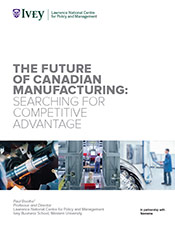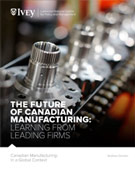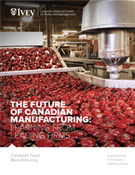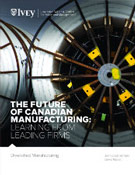Canadian manufacturing is at a crossroads. Faced with sustained foreign competition, we confront a stark question: How to build prosperous firms in a hyper-competitive global economy? The Lawrence Centre is involved in a three part research project to examine strategies to help Canadian companies to compete.
Attracting Global Mandates
 The Lawrence Centre's Phase II research, Future of Canadian Manufacturing: Attracting Global Mandates relies on Ivey's well-known case study methodology. Structured interviews were conducted with senior leaders of international firms in Canada and abroad to understand the strategies of Canadian subsidiaries of global firms who have successfully won global production or R&D mandates in Canada as well as the decision making processes of foreign firms considering greenfield investments. A conference was held on November 10, 2015 with over forty industry and government leaders as well as academic experts, to share their knowledge and insights and inform a set of recommendations for business and government action to attract more manufacturing investment to Canada. The project has been supported by a group of partners including CCCE, CIBC, IBM, Industry Canada and MEDEI. Project partners advised on firm selection and helped make connections with candidate firms. Visit us in early 2016 to view our final report.
The Lawrence Centre's Phase II research, Future of Canadian Manufacturing: Attracting Global Mandates relies on Ivey's well-known case study methodology. Structured interviews were conducted with senior leaders of international firms in Canada and abroad to understand the strategies of Canadian subsidiaries of global firms who have successfully won global production or R&D mandates in Canada as well as the decision making processes of foreign firms considering greenfield investments. A conference was held on November 10, 2015 with over forty industry and government leaders as well as academic experts, to share their knowledge and insights and inform a set of recommendations for business and government action to attract more manufacturing investment to Canada. The project has been supported by a group of partners including CCCE, CIBC, IBM, Industry Canada and MEDEI. Project partners advised on firm selection and helped make connections with candidate firms. Visit us in early 2016 to view our final report.
Searching for Competitive Advantage
 Canadian manufacturing was hard hit by the global recession. Compared with 2000, manufacturing GDP is down 11 per cent. Employment has declined by 24 per cent. Yet manufacturing continues to make a critical contribution to the Canadian economy. In order to succeed, Canadian manufacturers need to develop new strategies for competitive advantage. To help meet this challenge, in September 2015, the Lawrence Centre released a research paper partnership with Siemens Canada called The Future of Canadian Manufacturing: Searching for Competitive Advantage.
Canadian manufacturing was hard hit by the global recession. Compared with 2000, manufacturing GDP is down 11 per cent. Employment has declined by 24 per cent. Yet manufacturing continues to make a critical contribution to the Canadian economy. In order to succeed, Canadian manufacturers need to develop new strategies for competitive advantage. To help meet this challenge, in September 2015, the Lawrence Centre released a research paper partnership with Siemens Canada called The Future of Canadian Manufacturing: Searching for Competitive Advantage.
Learning from Leading Firms
In Phase I of the Future of Canadian Manufacturing Project (entitled Learning from Leading Firms) researchers conducted structured interviews with the senior management of nine leading Canadian firms from three sectors - auto parts, agri-food and diversified manufacturing. The goals of the project were to understand the strategies that led these firms to become successful global competitors and to canvas their views on best-practice public policy to support manufacturing. In reviewing the research results, firms, researchers and senior public servants, identified three areas for immediate action to help more Canadian firms achieve international success: business mentorships, educational partnerships and enhanced collaboration on investment attraction.





